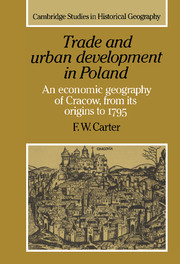Book contents
- Frontmatter
- Contents
- List of figures
- List of tables
- Preface
- Acknowledgements
- 1 Introduction: Cracow in context
- 2 Source materials and published literature
- 3 Cracow's early development
- 4 The political situation of Cracow, 1257–1500
- 5 European trade through Cracow, 1257–1500
- 6 The political situation of Cracow, 1500–1795
- 7 The commerce of Cracow, 1500–1795
- 8 Cracow: a final appraisal
- Appendix: Important dates in Cracow's history up to 1795
- Notes
- Select bibliography
- Index
- Cambridge Studies in Historical Geography
5 - European trade through Cracow, 1257–1500
Published online by Cambridge University Press: 07 October 2009
- Frontmatter
- Contents
- List of figures
- List of tables
- Preface
- Acknowledgements
- 1 Introduction: Cracow in context
- 2 Source materials and published literature
- 3 Cracow's early development
- 4 The political situation of Cracow, 1257–1500
- 5 European trade through Cracow, 1257–1500
- 6 The political situation of Cracow, 1500–1795
- 7 The commerce of Cracow, 1500–1795
- 8 Cracow: a final appraisal
- Appendix: Important dates in Cracow's history up to 1795
- Notes
- Select bibliography
- Index
- Cambridge Studies in Historical Geography
Summary
The main basis for Cracow's prosperity was trade. It was upon trade, particularly transit trade and industry that many of Cracow's citizens had to depend for their means of livelihood. The period from the granting of its municipal charter in 1257 to 1500 was to witness probably the greatest era of commercial success in its history, when the city was one of Europe's more significant emporia. Moreover, the years around 1500 may still be regarded as a convenient and satisfactory point at which to draw a line between the Later Middle Ages and the Early Modern Period. The sixteenth century awoke to new political and economic situations throughout the European continent and beyond; the growth of the Spanish Empire, discovery of America, new routes to the East, growth in the money supply, eclipse of the Mediterranean ports at the expense of the Atlantic seaboard, decline of the Hanseatic League and, perhaps most important for Cracow, the increasing pressure of the Ottoman Turks now being felt at the eastern extremities of Europe. Thus, in many ways other than the purely geographical, the sixteenth century was to see a slow process of change; adoption of radically new techniques, different business methods and independent solutions in areas experiencing a similar husbandry, all contributed to a wind of economic change blowing through much of the known world. Prior to these events, one still found cities like Cracow tied to the circumstances of medieval commerce.
- Type
- Chapter
- Information
- Trade and Urban Development in PolandAn Economic Geography of Cracow, from its Origins to 1795, pp. 87 - 169Publisher: Cambridge University PressPrint publication year: 1994



